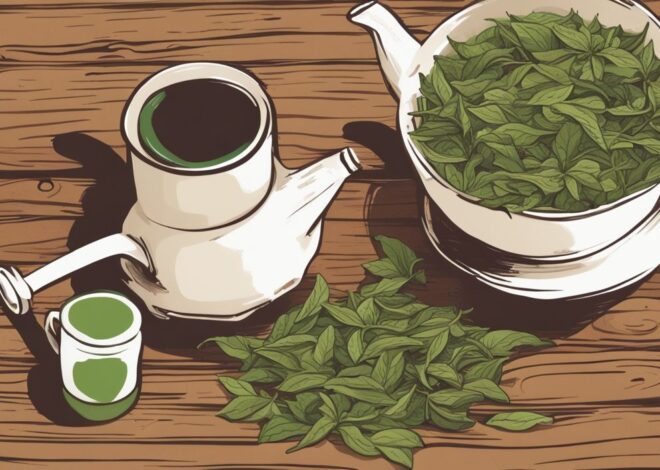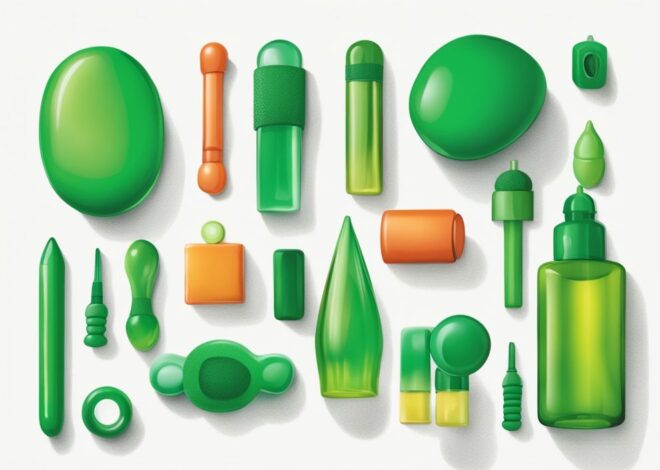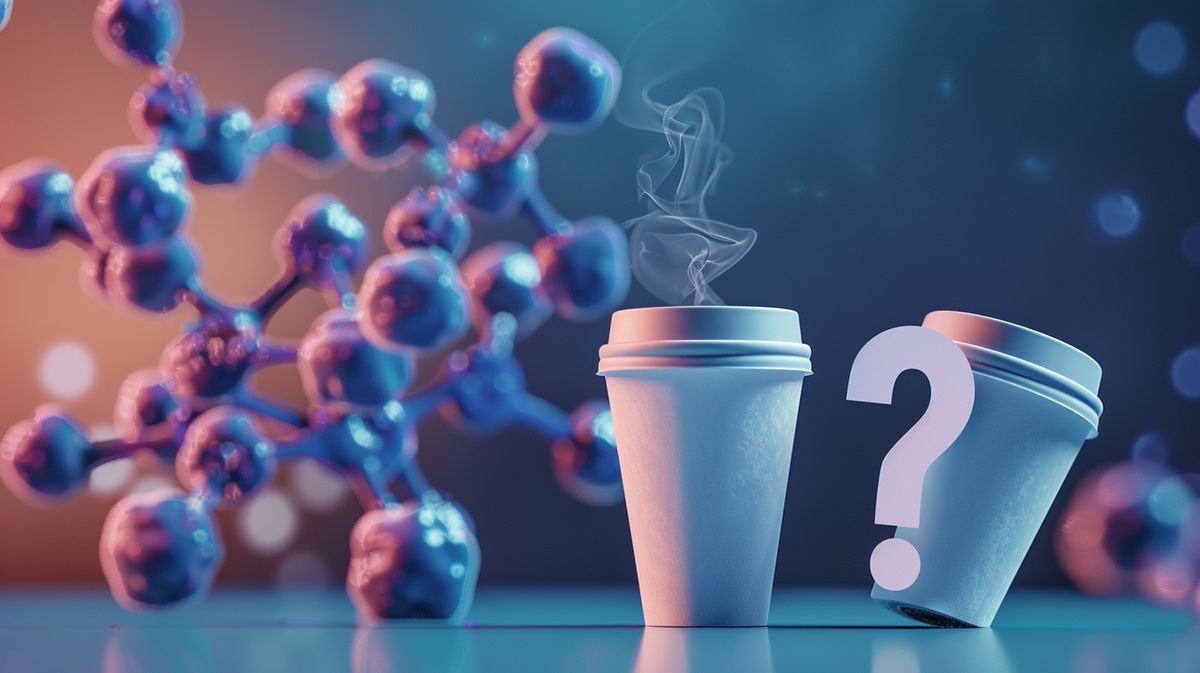
Unraveling the Truth: Do K cups Cause Cancer? An Investigative Insight
Hey there, fellow java junkie! Have you ever paused mid-sip of your morning brew to wonder, “Could my favorite K-Cup possibly deliver more than just caffeine?” It’s a question that’s raised many an eyebrow; do the ever so convenient K-Cups potentially hide a sinister side linked to cancer?
In this grand brew-haha of facts and figures, we’ll dive deep into the cup and swirl around the components, uncovering everything from the materials used to the chemicals involved. And let’s not forget the thrilling climax – what the heroes clad in white lab coats say about these concerns in undeniable scientific lingo.
You’ll also stumble upon a treasure of practical tips to continue indulging in your coffee, sans the worry. So buckle up, take a gulp, and off we go on this caffeinated crusade!
Examining the Materials and Chemicals in K-Cups
Materials Used in K-Cups
- K-Cups are primarily constructed from various plastics, with polypropylene (PP) taking center stage. Keurig, one of the well-known manufacturers, assures us that this plastic is safe. Despite that, the nagging question “do K cups cause cancer?” keeps surfacing, pointing fingers at these very materials.
- The lid of each K-Cup is a shiny little disc made of aluminum. This metal is like a seasoned gatekeeper, chosen for its superb barrier properties. However, the safety of aluminum in heated scenarios often raises eyebrows due to potential leaching.
- To sidestep direct contact between your beloved coffee and the aluminum lid, there’s an internal layer of food-grade plastic. This clever design aims to keep chemical interactions at bay, ensuring your coffee’s flavor and safety remain untainted.
Plastics and Chemicals in K-Cups
- Even though K-Cups boast about being BPA-free, it’s critical to remember that other sneaky chemicals like BPF and BPS can be lurking around. These compounds might carry health risks, reigniting the question, “do K cups cause cancer?” again and again.
- Both BPF and BPS belong to the notorious family of xenoestrogens. These synthetic substances are like hormonal impersonators, disrupting your body’s natural hormone functions by pretending to be estrogen. This impersonation act could potentially lead to a kaleidoscope of health issues.
Potential Health Risks of Chemicals in K-Cups
Endocrine Disruptors and Their Effects
Impact on Hormones and Fertility
- Imagine tiny villains like BPA, BPF, and BPS sneaking into your K-Cups, ready to throw your hormones into chaos. These pesky chemicals are known as endocrine disruptors, and trust me, you don’t want them gate-crashing your hormonal regulation party—especially if fertility is a concern.
- These disruptors are like hormone impersonators, mimicking estrogen and bringing xenoestrogens into play. Picture them as misguided actors in a hormonal drama, wreaking havoc on reproductive function and raining on the parade of sperm counts in men. Not the kind of drama you want!
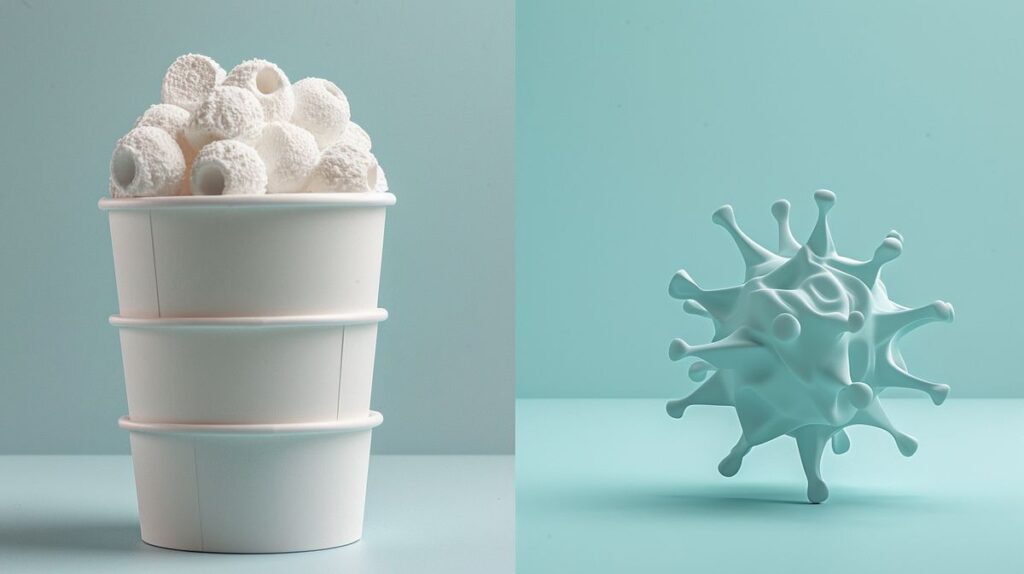
Risk of Various Cancers
- Studies might as well be shouting from the rooftops: the more you tango with endocrine disruptors, the more you might be risking some serious health issues.
In this eye-opening video, discover how the materials used in K-Cups could potentially leach harmful chemicals into your coffee when exposed to hot water, raising important questions about their safety and the risk of cancer.
We’re talking about cancers—breast, ovarian, testicular, and prostate cancers, to name a few. It’s a high-stakes game, this one. - And there’s more! Early puberty in girls and obesity, both tightly linked to these nasty disruptors, also up the ante when it comes to cancer risks. Imagine these disruptors donning villain masks, ready to pounce on the unsuspecting.
Aluminum Exposure Concerns
- Ever thought of your coffee as a potential aluminum cocktail? High temperatures and that delightful acidic kick of coffee can turn your K-Cup into a leaching cauldron of aluminum, seeping into your beverage. It’s like an unwanted guest at your coffee party.
- Long-term exposure to aluminum isn’t a walk in the park. We’re talking neurological disorders, depression, anxiety, and immune system troubles. Imagine aluminum as a trickster cloud, raining on your health parade day after day.
Heat and Acid Interaction with K-Cup Materials
- Boiling water and the sharp, acidic nature of your favorite brew can turn your K-Cup into a battlefield. It’s a showdown where harmful chemicals get the upper hand, leaping into your drink with alarming enthusiasm.
- Research reveals that almost all commercial plastics are ready to release their not-so-friendly endocrine-active chemicals under such intense conditions, and studies have even detected estrogenic chemicals in coffee, highlighting the importance of understanding these risks. To learn more, click here. It’s like a chemical jailbreak when you mix hot water and acidic coffee with K-Cups.
Chemicals in Coffee and Their Health Impacts
Every morning, millions of us indulge in the delightful ritual of brewing a cup of coffee, often using convenient K-Cups. But have you ever pondered what mysterious chemicals might be lurking in your daily brew? Let’s embark on an adventure to uncover the hidden health impacts of some common, yet concerning, coffee contaminants.
Glyphosate: The Herbicide Concern
- Imagine Glyphosate as an unwanted guest crashing our coffee party. Widely used on coffee crops to control weeds, this herbicide has been called “probably carcinogenic to humans” by the World Health Organization (WHO). Its presence in our beloved K-Cups raises eyebrows and concerns, prompting us to rethink each sip we take.
Ochratoxin A and Aflatoxins
- Now, let’s talk about those sneaky molds, shall we? Ochratoxin A and aflatoxins are like the villains of the coffee world, produced by molds that can taint our precious coffee beans. These harmful compounds are notorious for their carcinogenic effects, threatening our kidneys, brain, and immune system. Picture them as tiny saboteurs, making our daily cup a potential health hazard.
Acrylamide in Roasted Coffee Beans
- The roasting process of coffee beans is like a fiery dance, but it comes with a catch: acrylamide. This sneaky chemical forms during the roasting spectacle and carries a dubious reputation.
Dive into the evolution of coffee consumption and uncover the truth about acrylamide, a substance linked to cancer, and its implications for your favorite K-Cups. Learn how the coffee industry navigated potential crises and what recent studies reveal about coffee's health benefits!
Classified by the International Agency for Research on Cancer (IARC) as a probable carcinogen, acrylamide levels in coffee have been a hot topic since California flagged them as a risk in 1990. - Yet, not all is doom and gloom, dear coffee lovers! Recent studies suggest the link between dietary acrylamide and cancer in humans might not be as solid as we once feared. So, while acrylamide is a potential concern, the jury is still out on its true impact on our health.

Scientific Perspectives on K-Cups and Cancer
Hey there, curious coffee connoisseur! Let’s dive into the bubbly brew of science and health, shall we? We’re about to explore whether those adorable little K-Cups nestling in your kitchen could be villains in disguise. Hold on tight, we’re in for a ride!
Findings from Research and Studies
- Picture this: your K-Cup, happily brewing in the morning, unwittingly turning into a chemical leprechaun. Yep, exposure to xenoestrogens in K-Cups can be heightened by the piping hot and acidic conditions of coffee brewing. It’s like a chemical masquerade ball, with harmful substances sneaking into your cup.
- But here’s the twist: research consistently paints a rather reassuring picture. Moderate coffee sips, even if they’re from K-Cups, don’t seem to raise any significant health alarms. It’s a bit like enjoying a roller-coaster—exciting yet safe when done right.
Viewpoints from Health Organizations
- Now, onto the opinions of the big health honchos. Organizations like the WHO and IARC talk about these chemicals in K-Cups but also drop some calming wisdom. They suggest that moderate consumption isn’t likely to stir up any major health worries. It’s like they’re saying, “Enjoy your brew, just don’t turn into a caffeine fiend!”
- California’s Proposition 65 adds a layer of transparency, making sure products have warnings if they might cause cancer or reproductive harm. It’s the consumer’s secret weapon to staying informed—think of it as a personal health superhero cape.
Safe Practices for Using K-Cups
Wondering about the health implications of using K-Cups? Here are some savvy tips for enjoying your coffee without worry.
Moderate Coffee Consumption
- Ah, the eternal question: “Do K Cups cause cancer?” The answer lies largely in moderation, dear coffee aficionados. Studies suggest that moderate coffee consumption is not only safe but can even boost your mood and sharpen your focus. Plus, it might help fend off some chronic illnesses. Savor your cup, but as with all good things in life, enjoy it in moderation!
Using Reusable Alternatives
- If you’re a tad worried about the potential health risks tied to regular K-Cups, why not switch things up with reusable alternatives? Consider stainless steel or BPA-free reusable K-Cups. They significantly reduce exposure to pesky chemicals and are a win for Mother Earth, cutting down on that pesky plastic waste.
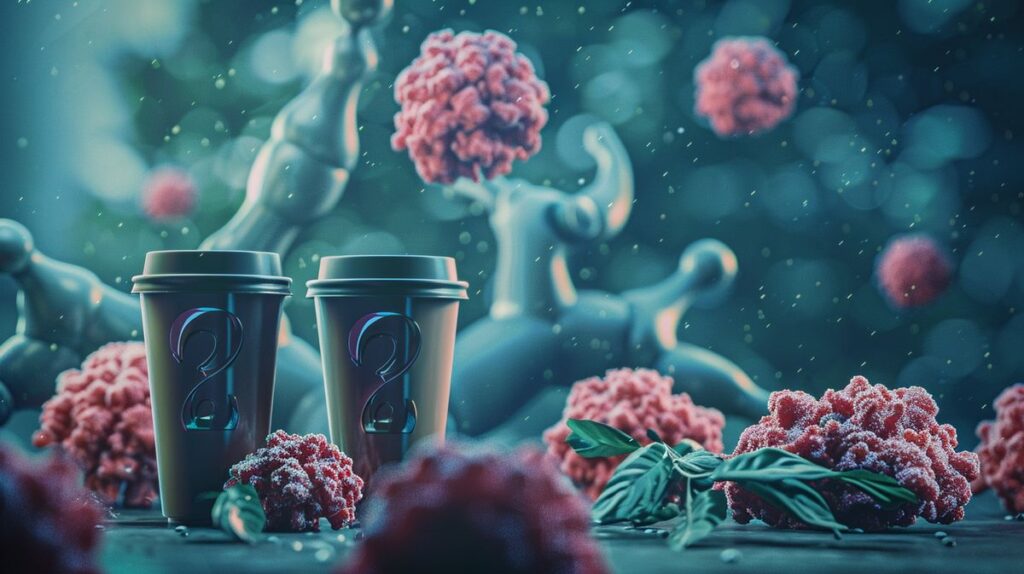
Proper Storage and Brewing Conditions
- Proper storage and brewing conditions are your best allies in minimizing exposure to harmful chemicals. Keep your K-Cups in a cool, dry spot to prevent any nasties from leaching into your beloved brew. When brewing, steer clear of water that’s too hot, as scalding temperatures can coax more chemicals into your cup.
- And watch out for those sneaky mycotoxins! Poor storage or brewing can usher these carcinogens into your coffee. Stick to recommended guidelines to keep your coffee as safe and delicious as possible.
Conclusion
The question “do K cups cause cancer” brings to mind vivid images of tiny plastic soldiers waging a battle inside your coffee machine. It’s a valid concern, especially when considering the plethora of chemicals used in their manufacturing. Yet, much like your favorite mystery novel, the plot thickens! Current evidence suggests that moderate consumption isn’t significantly harmful. Most health organizations agree that enjoying your morning brew from K-Cups in moderation is generally considered safe.
However, if you’re like me and prefer to err on the side of caution, why not embrace some nifty, eco-friendly alternatives? Consider switching to reusable K-Cups made of stainless steel or BPA-free materials. Think of them as the knight in shining armor for your morning routine! Additionally, practicing proper storage and brewing methods can further reduce exposure to potentially harmful substances. It’s all about that extra pinch of care!
Despite our deep dive into the world of K-Cups and their potential chemical villains, it’s important to remember the broader picture. Public health challenges such as obesity shouldn’t be pushed to the back burner. Balancing concerns about K-Cups with other significant health risks can help create a well-rounded approach to your overall wellness journey. So, let’s keep our health compass steady and navigate through this maze together!
FAQ
Immerse yourself in the world of K-Cups, where each tiny pod holds secrets that are begging to be unveiled. Whether you’re a coffee aficionado or just someone keen on learning more, these FAQs will shed light on the burning question: Do K-Cups cause cancer?
Are K-Cups BPA-free?
- Absolutely! K-Cups are BPA-free. Keurig uses polypropylene plastic, which has received the green light for being safe in food and beverages. So, enjoy your brew without the chemical queasiness!
What are xenoestrogens and how do they affect health?
- Ah, xenoestrogens! These sneaky mimics of natural estrogen can disrupt your hormonal harmony. Think of them as the pranksters of the chemical world, linked to issues like hormonal imbalances and a pesky increase in cancer risk.
Can aluminum in K-Cups harm the brain?
- Here’s a brain buster: prolonged exposure to aluminum, especially when heated or mingled with acids, isn’t doing your noggin any favors. It’s been associated with brain damage, depression, anxiety, and even autoimmune troubles. Yikes!
Is moderate coffee consumption safe?
- Good news for coffee lovers! Moderate coffee consumption is generally considered safe and might even come with a perk or two. Studies suggest there are health benefits hiding in each delicious cup.
What are some safer alternatives to regular K-Cups?
- If you’re seeking a safer sip, reusable K-Cups made of stainless steel or BPA-free plastics are the way to go. They not only cut down on potentially harmful chemicals but also make Mother Earth a bit happier. Win, win!
